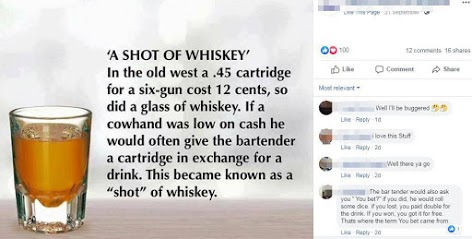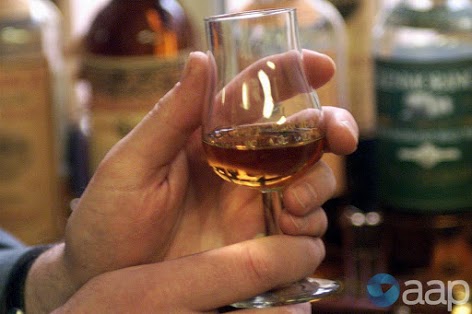The Statement
AAP FactCheck examined a Facebook post from September 21, 2019, by an Australian user featuring an image of a “shot glass” of whisky*, along with text under the headline ‘A shot whiskey’.

The post reads: “In the old west a .45 cartridge for a six-gun cost 12 cents, so did a glass of whiskey. If a cowhand was low on cash he would often give the bartender a cartridge in exchange for a drink. This became known as a “shot” of whiskey.”
The post has attracted more than 15 shares, 10 comments and 100 reactions.
* Note: Whisky is spelled ‘whiskey’ in American English, hence the discrepancy when the social media post is being quoted directly.
The Analysis
The Facebook post claims the word “shot”, in relation to whisky, comes from the “old west” which was an era generally defined from 1865-1895 and famous for cowboys, lawmen, gunslingers and outlaws.
The etymology of the noun ‘shot’ meaning “to shoot” is taken from Old English ‘scot/sceot’ and is related to the German word Geschoss, according to the Oxford English Dictionary. The Online Etymology Dictionary lists another meaning as to “discharge of a bow, missile,” from the related Old English ‘gesceot’. This was “extended to other projectiles in Middle English and to sports (hockey, basketball, etc.) 1868”.
Monash University linguistics expert Professor Kate Burridge told AAP FactCheck via email the historical veracity of the post was not true, but said the mythology made for compelling fiction.
“These stories are always so great – and I’m constantly raining on people’s linguistic picnics. Alas this isn’t the origin of the expression,” she said.
Prof Burridge said ‘shot’, in relation to whisky was the same as the noun ‘shot’ and related to the adjective ‘scot-free’.
Another meaning was ‘scots’ and ‘shots’ could refer to the amount to be paid at a tavern or perhaps for entertainment. For example, ‘to stand shot’ meant to pay the bill for everyone – it was an early version of ‘shouting everyone’, she explained.
“It’s probably from this meaning that shot might have [taken] on the sense of something like “a supply or amount of drink” (whatever amount would result from everyone’s contribution),” she told AAP FactCheck. “And from there we can get to the more modern meaning “a shot of spirits” (a meaning that arose just last century).”
University of Melbourne language expert John Hajek agreed the Facebook claim was not true.
“It’s just made up. A ‘shot’ is probably the result of when you’re pouring the drink. That sudden jerking movement is where it almost certainly came from. It was also a word for payment in a pub or bar, which goes back to the 15th century.”
Macquarie Dictionary chief editor Alison Moore also rejected the social media post’s claim.
“The origin of this sense of shot has been investigated in the past, and I’m afraid that the colourful Wild West theory has been pretty soundly debunked,” she told AAP FactCheck.
The Online Etymology Dictionary lists ‘shot’ in relation to a small drink of straight liquor, as being first used in 1928 followed by ‘shot glass’ in 1955.
US fact-checking unit Snopes also examined the post and found one shot of whisky would have likely cost the equivalent of 10 cartridges.
“Even allowing for price variations according to time and place, it appears highly doubtful a one-to-one correspondence between the price of a cartridge and the cost of a drink ever existed in the Old West,” Snopes reported.
The Verdict
Based on the evidence, AAP FactCheck found the Facebook post to be false. The Oxford English Dictionary states the term ‘shot’, in relation to whisky, has both Germanic and Old English origins and two linguistics experts and a Macquarie Dictionary editor also told AAP FactCheck the claim was not true.
False – The primary claim of the content is factually inaccurate.
* AAP FactCheck is an accredited member of the International Fact-Checking Network. To keep up with our latest fact checks, follow us on Facebook, Twitter and Instagram.
First published September 25, 2019, 14:49 AEST


















